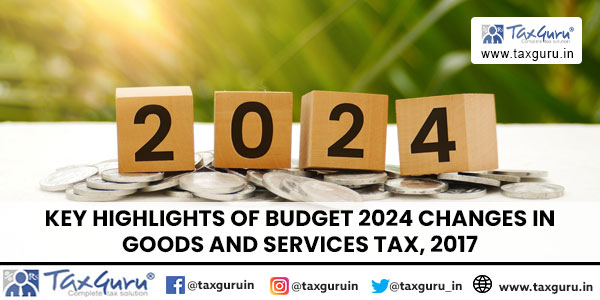Executive Summary
In her seventh presentation of the Union Budget, Finance Minister Nirmala Sitharaman has introduced significant reforms in the Goods and Services Tax (GST) framework, aimed at enhancing the ease of doing business and resolving longstanding procedural issues. Key changes include amendments related to Scope of Supply, Time of Supply, Input Tax Credit (ITC), and the introduction of an Amnesty Scheme under Section 73. The insertion of Sections 74A and 11A, as well as revisions to the penalty provisions, underscore the government’s commitment to streamline tax processes and reduce litigation for businesses.
The Key amendment proposed in Budget is as below:
1. Scope of Supply
A. Following activity shall not be treated as Supply of Goods or Services (Addition in Schedule III)
i. The Activity of Apportionment of co-insurance premiums by the lead insurer to co-insurers for jointly supplied insurance services, provided the lead insurer pays GST on the full premium amount received from the insured.
ii. Services provided by an insurer to a reinsurer for which a ceding commission or re-insurance commission is deducted from the re-insurance premium paid by the insurer, provided the reinsurer pays GST on the total reinsurance premium
iii. It is proposed to exclude from GST, the Extra Neutral Alcohol used in manufacture of alcoholic liquor for human consumption. At present, it is subject to GST.

2. Transitional credit on input services received by an Input Service Distributor will be permitted, regardless of whether the invoices were received before, on, or after 1st July 2017.
- Mandatory filing of TDS returns by TDS Deductors even if no deductions are made; the time limit for filing such returns to be prescribed.
3. Time of Supply for RCM
The amendment is proposed in Section 13 of IGST Act, 2017, Where In case supply is covered under RCM in terms of Section 9(3) and Section 9(4), Where supplier is not required to issue invoices, the Time of supply of services shall be within 60 days from the date of invoice issued by the recipient.
4. Input Tax Credit (ITC)
i. It is proposed that the registered person shall be entitled to take Input Tax Credit (ITC) in respect of an invoice or debit note for the Financial Years 2017-18, 2018-19, 2019-20 and 2020-21, in any return filed u/s 39 up to 30th November, 2021. [W.e.f. 1st July, 2017]
ii. Amendment is proposed to allow availing of ITC in respect of an invoice or debit note in a return filed for the period from the date of cancellation of registration or the effective date of cancellation of registration, as the case may be, till the date of order of revocation of cancellation of registration, filed within thirty days of the date of order of revocation of cancellation of registration, subject to the conditions of Section 16(4) of the act. [W.e.f. 1st July, 2017]
iii. At present the ITC for the tax paid u/s 74 (Fraud or wilful misstatement) is not available as per section 17(5)(i). it is proposed to make available the ITC in respect of tax paid under section 74 for FY 2024-25 and onwards (SCN in case of fraud), including tax paid under section 129 (in case of detention, seizure and release of goods in transit) and under section 130 (Confiscation of goods).
5. Returns
- It is proposed to make it mandatory to furnish a TDS return (GSTR 7) for deduction of tax for every calendar month whether or not any deduction of tax have been made during the month.
6. Investigation
- It is proposed to enable an authorised representative to appear on behalf of the summoned person before the proper officer in compliance of summons issued by the said officer u/s 70 of the act.
B. AMNESTY SCHEME
- New section 128A is proposed to be inserted to provide for a conditional waiver of interest and penalty in respect of demand notices issued u/s 73 (Other than fraud or wilful misstatement) for the FY 2017-18, 2018-19 and 2019-20. (waiver is not applicable for demands notices in respect of erroneous refund).
- It is required to pay in full the amount of tax on or before the notified date to avail the conditional waiver.
- Further, in cases where interest and penalty have already been paid against the demand for any of these 3 years, no refund shall be admissible for the same.
1. Sunset clause for Section 73 and 74
- Provisions of Section 73 and 74 shall be applicable for determining tax up to the period of FY 2023-24 only.
2. New Section 74A has been Inserted
- New section 74A (Common for 73 and 74) is being introduced to have common time limit for issuance of notices and orders instead of present different provisions for cases involving fraud / suppression (Section 74) and other cases not involving fraud / suppression (Section 73) for FY 2024-25 and onwards.
- Notice u/s 74A can be issued within 42 months from the due date for furnishing annual return GSTR 9 for any financial year; and within 42 months from the date of erroneous refund.
2. Penalty Provision till FY 2023-2024 and for FY 2024-2025 onwards
A. Penalty Provisions till FY 2023-2024 (31-03-2024)
| Provision | Section 73
(Case Not involving FRAUD) |
Section 74 (Case Involving FRAUD) |
| Maximum Penalty | Penalty Provisions till FY 2023-2024 | 100% of tax due |
| Penalty amount of Tax and Interest is paid | ||
| Before the Service of Notice | NIL | 15% of tax due |
| Within 30 Days of the Issue of Notice | NIL | 25% of tax due |
| Within 30 Days of Communication of the Order | 10% of tax due or Rs. 10,000, whichever is higher | 50% of tax due |
B. Penalty Provisions from FY 2024-2025 onwards (from 01-04-2024 onwards)
| Provision | Section 74A
(Case Not involving FRAUD) |
Section 74A (Case Involving FRAUD) |
| Maximum Penalty | Penalty Provisions till FY 2023-2024 | 100% of tax due |
| Penalty amount of Tax and Interest is paid | ||
| Before the Service of Notice | NIL | 15% of tax due |
| Within 60 Days of the Issue of Notice | NIL | 25% of tax due |
| Within 60 Days of Communication of the Order | 10% of tax due or Rs. 10,000, whichever is higher | 50% of tax due |
C. Pre-Deposit
- It is proposed to reduce the maximum amount of pre-deposit for filing appeal before the Appellate Authority from Rs.50 Crores
- In case of appeal before the appellate tribunal, the minimum amount of pre-deposit is reduced from the existing 20% of tax to 10% of tax in dispute; and the maximum amount of pre-deposit is reduced from the existing Rs.100 Crores [(CGST + SGST) or (IGST)] to Rs.40 Crores
1. Other Important changes
i. By proposed insertion of new section 11A, the government shall be empowered to regularise non-levy or short levy of GST as a result of general practice prevailing in trade.
ii. The government may authorize the Principal Bench of the GST Appellate Tribunal (GSTAT) to examine or adjudicate anti-profiteering cases.
iii. Transitional credit on input services received by an Input Service Distributor will be permitted, regardless of whether the invoices were received before, on, or after 1st July 2017.
The Budget 2024, presented by Finance Minister Nirmala Sitharaman, marks a decisive step towards creating a more business-friendly environment. By addressing key issues related to GST compliance and reducing the burden of procedural litigations, the government aims to foster a more transparent and efficient tax system.
The stake holder will find these changes particularly beneficial as they navigate the evolving regulatory landscape. The emphasis on clarity, compliance, and reduced penalties highlights the government’s focus on supporting economic growth and simplifying the tax framework.





